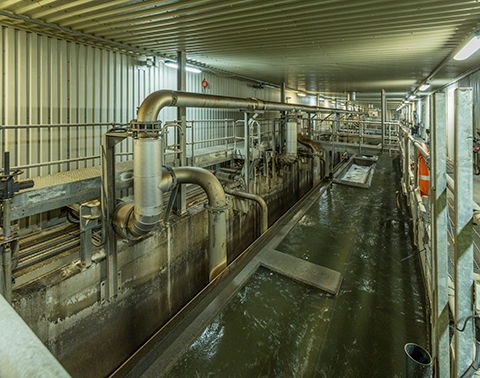
Posted to News on 20th Oct 2022, 11:11
How to select the right air blower technology

Kirk Lyons, national sales manager for low pressure at Atlas Copco Compressors, details the different low-pressure blower technologies available for water and wastewater treatment plants, and explains how to select the right blower to deal with specific application process requirements.
Up to 70% of the energy consumption in water and wastewater treatment plant operations is used by air blowers. Therefore, in the face of rising energy costs, it is vital to select the right energy-efficient blower technology that can help to keep electricity costs down.
Low-pressure blower technologies
Low-pressure blowers are categorised as lobe, screw, centrifugal, and multistage blowers, and there are two types of positive displacement blower technologies which are widely used in aeration applications: screw blowers and lobe blowers.
Screw blowers: When the focus is on running costs, oil-free screw blowers are the most suitable positive displacement technology. Oil-free air blowers are a wise choice as they ensure that no oil from the blowers will be added to the treatment processes. If a blower is ISO 8573-1 (2010) Class 0 certified, it guarantees that the air is not contaminated by oil during the compression process.
Up to 35% more energy-efficient than traditional lobe blowers, screw blower technology can cope with fluctuations in air demand and operate from 100% capacity to 25% with very little change in specific power requirement. They demand less energy because the internal compression concept offers higher efficiency derived from the design of its rotor elements.
Lobe blowers: Compared to screw technologies, lobe blowers attract a lower initial investment cost. With a simple design and reliable operation, the latest generation of low-noise, low-vibration, low-pulsation tri-lobe blowers is capable of sweeping nearly six times the volume of air in a single revolution compared to its belt-driven, twin-lobe predecessors.
Centrifugal blowers: High-speed turbo blowers, multistage blowers, and multistage centrifugal blowers are primarily designed for low-pressure applications that require higher flow rates of over 5,000 m3/hr. Oil-free, high-speed turbo blowers with frictionless direct drive are an ideal fit for larger plants, as they are highly efficient, reliable, and designed to ensure a low total cost of ownership, often resulting in a payback of the investment cost over a short period of time.
Operational costs and TCO
The capital cost of a low-pressure aeration lobe blower may represent less than 5% of a total wastewater plant’s investment. This may appear to be an attractive proposition, but blower running costs are a far more significant factor and are likely to constitute up to 70% of the electricity costs for an entire wastewater treatment plant.
This is because the aeration blowers need energy to run 24 hours a day to support the biological processes. They supply the right amount of oxygen to micro-organisms, maintaining their constant, balanced performance within the plant. When considering the total cost of ownership of a blower installation, the need to seek an energy-efficient solution should be at the top of the list.
The right blower for the application
In addition to operational costs and total costs of ownership, other key factors that should be taken into consideration when choosing the right blower for the application are flow and pressure, operational noise levels, and the provision of service support.
Flow and Pressure: For every 1 bar(g) the air is compressed above the actual demand, 7% of energy is wasted; therefore, a correctly sized blower installation will help to achieve a more energy-efficient process.
Operating noise levels: The latest generation of low-pressure blowers feature intelligent baffle and canopy design that provides reduced sound levels down to 72dB(a) for an improved working environment. Installation costs are reduced as there is no need to provide noise-insulated rooms and doors.
Service and lifetime support: In the latest design developments in oil-free, low-pressure blowers, we see the inclusion of low maintenance components, extended on-site service intervals, and the benefits of lifetime customer support plans.
A recent case study with Scottish Water shows how after replacing 19 traditional roots-type lobe blowers with 17 modern rotary screw blowers, an annual energy saving of 25% at the Nigg wastewater treatment works was achieved, as well as a continuous, uninterrupted operation and a reduced maintenance routine.
In conclusion, the best solution will be one that ticks all the boxes on questions of the type of blower technology, its physical size and capacity, its level of energy efficiency, and the total cost of ownership. The ultimate aim is for a blower system that provides total reliability, guaranteed continuity of process operations, and combines optimum performance with protection of the process, the environment, and operational energy costs.
Download Atlas Copco’s eBook: ‘How to select the right air blower technology for water and wastewater treatment plants’ – a complete guide to the selection, operation, and opportunities for energy saving to be derived from air blower technology for water and wastewater treatment plants. Plus, application success stories of companies who have benefitted from their installation choice.
Want the latest machine building news straight to your inbox? Become a MachineBuilding member for free today >>

















